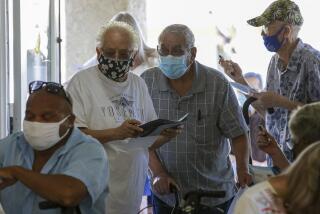Medicare Campaign Cuts Overpayment Rate by Half
- Share via
WASHINGTON — Medicare’s aggressive campaign to fight fraud and overbilling has cut the improper payment rate in half in just two years, but the giant health program for the elderly still paid health care providers $12.6 billion last year for services that cost too much or were never provided, federal auditors said Tuesday.
In 1996, when the government began systematically auditing a sample of claims by doctors, hospitals and other agencies, its erroneous payment rate was estimated at 14%. In 1998, the rate was 7.1% of Medicare’s yearly spending of $176 billion.
“We finally feel we have turned the corner,” June Gibbs Brown, inspector general of the Health and Human Services Department, told a news conference.
The cases uncovered by auditors ranged from a hospital that billed Medicare for dialysis for a kidney patient who never showed up, to a doctor who claimed he made 40 hospital visits but could prove only 18, to an ophthalmologist who submitted a bill for an office exam of a patient who was undergoing abdominal surgery in a hospital.
Keeping the Medicare system running smoothly and honestly is an enormous task: more than 800 million claims for services are filed each year on behalf of 40 million beneficiaries--those over 65 and the disabled of all ages.
The figure of $12.6 billion in questionable payments includes all forms of incorrect payments--clerical errors and overcharges, bills without proper documentation and cases of outright fraud. Officials said they cannot determine specifically how much of the total can be considered fraudulent.
The results for fiscal 1998 represent a significant improvement from a total of $20.3 billion, or 11%, in fiscal 1997; and $23.2 billion, or 14%, in fiscal 1996.
While the new report “shows a very significant turnaround,” the amount of improper payments “is too much and we will not reduce our efforts” to cut down on waste and fraud, Brown said.
The official report of the inspector general’s office, an independent investigative arm of the Department of Health and Human Services, praised Medicare’s progress. “We have found positive indications that fee-for-service payment errors are declining and the health care providers are doing a better job in reducing the number of unsupported services to Medicare beneficiaries,” the 18-page report said. But it warned that three years of audits have demonstrated that the “program remains inherently vulnerable to improper payments.”
By law and tradition, Medicare emphasizes rapid payments to hospitals, doctors and other providers of services. The investigation of mistakes, or cheating, comes after the fact, and it has often been sporadic. But the Clinton administration, running a program called Operation Restore Trust, has spent more to detect and punish fraud with congressional approval. The FBI has assigned more agents to the effort and U.S. attorneys have become more aggressive in prosecuting fraud cases.
“We have turned the corner and we are heading in the right direction,” said Nancy-Ann Min DeParle, who heads the Health Care Financing Administration, which runs Medicare. She pledged to “continue the aggressive effort to fight waste, fraud and abuse.”
The inspector general’s study selected a random sample of 600 Medicare beneficiaries and reviewed all of the health care claims filed for them during the year, a total of 5,540 bills with aggregate charges of $5.6 million. The sample was structured to review all sorts of Medicare bills--from doctors, hospitals, skilled nursing facilities, home health care agencies, clinical laboratories, free-standing surgical centers and providers of durable equipment, such as prosthetic devices.
Each claim was reviewed to determine if the service promised was delivered, if the price charged was correct and if the medical service or procedure was justified. The auditors found that 915 of the 5,540 claims were questionable.
When the claims were originally submitted, they “contained no visible errors,” according to the inspector general’s report. When the medical records were reviewed in detail by auditors, the improper payments were detected. Projecting the results of the sample survey on a national basis yielded the estimate of an error rate of 7.1%, and unjustified claims of $12.6 billion.
More to Read
Sign up for Essential California
The most important California stories and recommendations in your inbox every morning.
You may occasionally receive promotional content from the Los Angeles Times.













